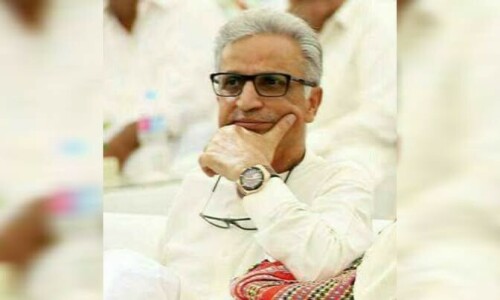SUKKUR: The Sindh Human Rights Commission has expressed its resolve to protect fundamental and other constitutional rights of all citizens regardless of their caste, creed and religion.
SHRC chairman Iqbal Detho reiterated the commission’s commitment while speaking at an awareness workshop, held in a local hotel on Saturday, on the ‘Sindh Hindus Marriage (Amendment) Act 2018’.
The workshop was aimed at raising awareness of minority communities’ constitutional rights and the protection laws available to the Hindu community in Sindh.
Mr Detho said that under Article 25 of the Constitution, all citizens of Pakistan have equal status and rights.
Regarding the Sindh Hindus Marriage (Amendment) Act 2018, he said there were three aspects of a marriage contract: determination of legal age of bride/groom; minimum age of 18 years and mental capacity and consent of the contracting party; and registration of the contract by local government under Section 4 of the Act.
“We believe that it is important to promote mutual respect and understanding among different religious communities in Sindh. The SHRC remains committed to fostering an environment of tolerance and peaceful coexistence.”
Mr Krishan Sharma from the National Lobbying Delegation and Mr Sukhdev (a political figure) gave a presentation on the evolution of Hindu personal laws in Sindh.
Mr Sharma said: “We are pleased to share our knowledge on the historical evolution of Hindu personal laws in Sindh. This workshop provides an opportunity to enhance understanding of these laws and their significance for the Hindu community.”
Ms. Pushpa Kumari (also from the National Lobbying Delegation) discussed the ‘Prospects of Sindh Hindus Marriages Laws’, and said: “The Sindh Hindus Marriage (Amendment) Act 2018 is an important piece of legislation that provides legal protection to the Hindu community in Sindh. However, there is a need for greater awareness and understanding of these laws to ensure their effective implementation.”
Barrister Rida Tahir talked on ‘Issues with the Marriage Registration Process’ based on SHRC observations and perspectives. She said: “The SHRC has identified several issues with the marriage registration process including delays and lack of access to information. We hope that this workshop will provide an opportunity to identify possible solutions to these challenges”.
The workshop concluded with an open discussion on possible interventions to enhance marriage registrations.
Speaking about the discussion, Mr Detho said: “We have had a productive discussion on ways to enhancing marriage registrations in Sindh and it’s encouraging to see such engagement and commitment from stakeholders.”
Lastly, Mr. Detho emphasized the need for effective implementation of the Act. He noted that rules were framed in December 2017 whereas a notification from the local government for its implementation came out in July 2019.
He stressed on continued collaboration among stakeholders to ensure effective implementation of the Act.
He hoped that this workshop would help stakeholders develop a roadmap for further action.
The workshop was attended by civil society members, legal experts and representatives of the Hindu community, besides the officials concerned.
Published in Dawn, April 30th, 2023













































